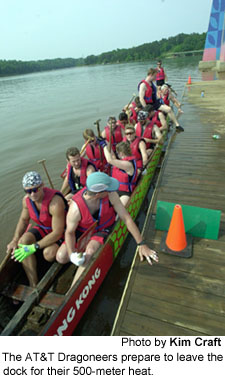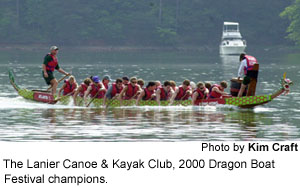
May 23, 2000 — Henry Kannapell and I stood along the shore, studying the sun-soaked waters of Lake Lanier, sizing up our opposition.
We were silent for a moment. And then Kannapell — one of my 20 or so teammates for the sixth annual Hong Kong Dragon Boat Festival of Atlanta, held for the first time at Gainesville, Ga.’s Clark’s Bridge Park Olympic venue on Saturday — spoke.
“The competition is really stiff,” he said, as the dragon-headed 40-foot canoe glided across the finish line, one drummer, one steerer and 18 paddlers on board. “They looked really good, I thought.”
I thought so, too. The rest of our team likely did, as well. But never did we think we were actually going to lose to them — or, at least, none of us would admit to it out loud.
I mean, we were the AT&T Dragoneers, the event’s five-time defending champion, the team that finished fourth in the nation just two years ago.
Kannapell and I were two of the team’s six rookies this year. We had been training for the regatta for nearly a month. We were confident.
But our primary competition had been training for years. They were the Lanier Canoe & Kayak Club, the reigning sprint paddling national champions. Newcomers to the dragon boat festival, they were eager to defend their course, their lake.
Our early returns were good. We had won our 500- and 250-meter heats by substantial margins. But so did the Lanier club.
And then we got word of the times.
We were 18 seconds behind Lanier in the 500, eight in the 250. You could hear the confidence start to crumble.
We reasoned the 26 seconds away, however. We had more of a headwind during our heats, more of a wake to work through, we would say. We had a leaky boat.
All true. And when we headed into the boathouse to analyze a videotape of our earlier performance, we found few mistakes. Our matching and power were solid. Many of the veterans on the team said our boat moved faster on Saturday than it did in several of AT&T’s championship years.
We actually felt rather good about our chances heading into the finals.
 “I’m interested to get both boats out there together,” said my team captain Richard Stokes after the heats. “When it’s even, we’ll see what they really have.”
“I’m interested to get both boats out there together,” said my team captain Richard Stokes after the heats. “When it’s even, we’ll see what they really have.”
Well, we saw what they had in the 500 final. We saw it quite well. We had a nice consistent view of the back of their boat.
It all happened quite quickly. There we were, floating at the start line, listening to the starter: Lane one, back. Lane two, up. Attention, please.
He fired the gun.
We began our start — a furious 40 strokes designed to get the boat moving quickly and to break us away from the pack early.
Evidently, the Lanier club had the same intentions. Before the smoke from the starter’s pistol had cleared, they already held a boat-length lead. There would be no catching up.
Not in the 500. Not in the 250, either. The same outcome, only sooner.
“We’ve been behind in previous years,” said my Dragoneers teammate Phil Webster. “But it was because we had messed up, and then once we got going we would just blow by them. But these guys … We just ran into a good team.
“But it gives us something to work toward.”
The two teams couldn’t have been more different. Mine was made up primarily of strong, adult males, many of whom were pushing 200 pounds.
The Lanier club, on the other hand, was probably half teenage girls. The team was young, lean and sinewy. They train daily. Lake Lanier runs through their veins.
“Theoretically, it’s not that different than sprint racing,” said Lanier head coach Tony Hall after the races. “You’ve got to feel the resistance. Naturally, a lot of our guys, they instinctively move to the resistance and pull.”
Instincts or not, there’s still something quite humbling about receiving a post-defeat handshake from a 14-year-old string bean of a girl who likely weighed several pounds less than my team’s 98-pound drummer.
Hall, a former Canadian Olympic paddling coach and perhaps the only Montreal Expos fan this side of, well, Montreal, played it quite coy in the weeks leading up to the race. “If you can’t beat us, you’re really bad,” he would say to me. “Dan, I’m having trouble finding people to fill the boat.”
Oh, he filled the boat, all right. He filled it good.
“We just got outclassed today,” said Stokes, who is about as competitive as they come.
I too hate to lose. Don’t care for it one bit.
But if you must lose, at least let it be to the best paddlers in the nation — 14-year-old girls and all.
